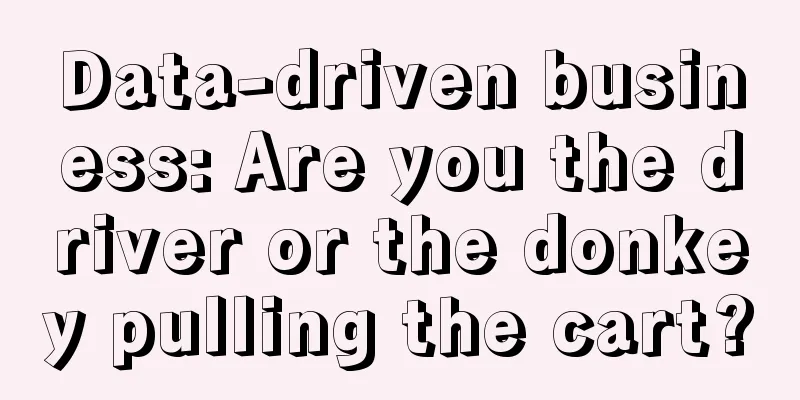Alas, I was defeated by AI search

Search Quotient is very important to me. Why? I usually write articles and read a lot of content, and I often need to find accurate, in-depth data and first-hand information from the Internet. Traditional search provides a lot of data, but the answers it gives are based on keyword matching, which may not be accurate and cannot satisfy me. So, the search has been bothering me. So, my daily behavior is like this. Whenever a company releases something new or a big shot gives a speech, I will immediately open WeChat and search. For example, what did Lei Jun say recently? I want to know what he talked about. Is there anything useful for me or something that can bring me new inspiration? Baidu, I will use it to search for more official and systematic information. For example, "encyclopedia knowledge, company news, topic aggregation", and when I need to understand a topic in depth or get detailed background information, I will choose it. As for Zhihu, I will search for questions that require professional perspectives. For example, what are the views within the industry, such as what is the daily workflow of a programmer? How to become a high-quality content creator? Where do designers find inspiration? How to start a business? What is the first step to start a business? The differences between Eastern and Western philosophy, etc. In addition, I also read discussions on hot social topics, etc. For Xiaohongshu, I will search for some shopping tips, travel experience sharing, daily life tips (home storage, recipe tutorials, fitness methods), and care and beauty movie recommendations. As for Douyin, it is basically digital reviews, hot topic comments, etc. So, for me, search is not simply an online behavior, but also a bridge connecting knowledge, information, inspiration and daily life, and I value it very much. 01Today, Kunlun Wanwei released "Tiangong AI Search", here is the internal test address: https://search.tiangong.cn . Before talking about this product in depth, I would like to mention a name that fascinates me: "Tiangong Enlightenment" . This name is like a bright beacon, which immediately attracted me in the vast ocean of information. So, what does it mean? Tiangong: An ancient Chinese word that refers to the uncanny workmanship of nature or the craftsmanship and skills beyond ordinary people. In ancient literature, it usually describes some outstanding works of art or some ultimate skills, which have an inimitable, proud and pure sense of craftsmanship. Enlightenment: In Buddhism, it refers to a sudden and profound understanding of the truth of the universe or a thorough recognition of the true meaning of life. In the eyes of the public, it represents a kind of mental awakening and a deepening of understanding. Taken together, Tiangong Kaiwu is a product that combines technology and wisdom. It has both extraordinary technical strength (Tiangong) and profound cognition and understanding (Kaiwu). I have to say, whoever came up with the name, adding chicken legs, is really clever. Okay. Now that we understand it, let's talk about what Tiangong AI is. Let's take a look at the official answer first: Kunlun Wanwei said that the search engine uses large language model technology, which can understand user intentions through conversational interactions and provide accurate and personalized answers. Traditional search engines are based on keyword matching, that is, identifying the search scope based on the keywords entered by the user and matching massive amounts of information that may meet the user's intentions. AI search based on large model capabilities is a generative search where users can clearly express their intentions through natural language and obtain effectively organized and refined answers. In addition, Tiangong AI Search will soon have multi-modal search capabilities such as images and voice, which will unleash productivity and improve user efficiency to a greater extent; this product will become a new generation of Internet infrastructure and super traffic portal, and will bring more innovative, intelligent and diversified application-level AI products. Oh, I really can’t stand reading these stereotyped essays. So, I can understand it in plain words as a new type of search engine. Unlike the traditional search engine that only searches by keywords, it can "chat" with you , understand what you really want to ask, and then give you a more thoughtful answer. In the future, it can not only read text, but also listen to voice and look at pictures to help you search. Suddenly, it occurred to me that this was just Bing connected to ChatGPT. What's the big deal? So I decided to analyze it from three aspects to see if there was really any difference. 021. Ability to understand contextWhat is context? Simply put, it is the ability to accurately understand complex, multi-layered, and ambiguous queries, and whether the context can be maintained in continuous interaction and question-answering. I started with ambiguous words. Ambiguous words include those vague and uncertain words that have multiple interpretations and meanings in a sentence. These words can not only test the AI search product's ability to judge and process ambiguous words, but also examine its sensitivity to culture and context. for example: I lost it today, the advantages of Apple, the hardness of the pencil, where the superstar is, Jay Chou's green hat, the memory of goldfish, the glory of the king, the meaning of working, you throw these questions to it and see what happens. After several rounds of evaluation, in my opinion, how to compare its replies with Baidu is much stronger, but it also has weaknesses. for example: Regarding the fact that I lost it today, Tiangong AI search gave me some references about "it". It reasoned and told me that "losing important things is painful" and I should learn to face the facts. Therefore, Tiangong has basic reasoning. However, when it comes to the benefits of apples, it does not provide any information about "Apple products, Apple company", but instead gives some answers about "apple" in the fruit category. As for "Where is the superstar", Tiangong AI search is quite smart. It first explains that superstar is a relative concept. It depends on whether you are referring to a superstar as a person or an object. It also gives explanations in different fields. But when it comes to the issue of "Jay Chou's green hat", it gave me nothing, but it expressed the meaning of working from multiple dimensions. So I think that Tiangong AI Search has demonstrated a high level of judgment and understanding, especially when it comes to multi-meaning, multi-domain queries. It still has certain blind spots for some specific, culturally related or trendy issues; this blind spot may be due to insufficient training data for the algorithm, or the algorithm's priority setting is not perfect when dealing with certain specific problems. In a nutshell, it is quite good at searching for common sense in daily life. Is that all it can do? Let's move on to something more complicated. 2. Deep Knowledge IndexDeep knowledge can be understood as academic and very professional questions. This test can verify whether the AI model can provide answers from deep, complex, and potentially less mainstream and non-public knowledge. for example: In 2021, Wang Zhiyuan wrote a book called "Compound Interest Thinking". Based on the concept of compound interest thinking in economics, what is the difference between the two? ; How does "Faust" describe human beings' thirst for knowledge and power? Make a brief comparison based on Nietzsche's superman theory. What is the principle of quantum entanglement phenomenon? Explain its application value in quantum computers; from an economic perspective, explain the law of diminishing marginal utility of capital and compare it with the concept of marginal benefit. Or, what is the principle of competitive exclusion in ecology? Can you explain it with real-life examples? Explain the advantages of traditional copper wire communication in the working principle of fiber optic communication. I threw these questions to it one by one, and guess what? The answer shocked me. Regarding my book and the compound interest thinking in economics, Tiangong AI Search said that the compound interest defined by the market belongs to an investment concept, while Wang Zhiyuan's compound interest mainly talks about personal growth and application of thinking methods, which are completely different. On the issue of "Faust", it directly and simply outlines what Faust and Nietzsche's superman theory is about, then defines it and gives the main differences. The explanation of the "Law of Diminishing Marginal Utility, Conceptual Comparison" is also very clear. However, the theory always gives me a headache, so I asked it to give me an example, and it said this: Suppose you are enjoying a delicious meal. At the beginning, you may feel very hungry, and the first bite of food will bring great satisfaction, which is the marginal utility. As you continue to eat, your hunger is appeased, and the incremental utility of each bite of food gradually decreases. Just like, when you are already full, the utility of taking another bite of food is very small, and may even feel uncomfortable. This is the concept of diminishing marginal utility. How do you feel after watching it? Oh my god, this rookie can actually analyze. However, I am not satisfied. I then asked him if he could find some new and unique cases that were reported in academic papers. What do you think? He actually gave me some more, and gave me references and dates. I also spent about an hour assessing the in-depth knowledge in multiple disciplines such as literature, physics, biology, and engineering. I'm not exaggerating, but I'm very satisfied with the results. However, although my evaluation of it is positive, it does not mean that it can excel in all areas. Take the details of academic reports, for example. Although citations and time are given, in-depth research methods are not provided. This may also involve "data privacy" issues, but it doesn't matter, let's continue and get more complicated. 3. Adaptive learning and personalizationWhat does this mean? I want to see if Tiangong AI Search can adjust itself and answer my current and future questions more accurately based on the questions I asked in the past and my preferences, and give me more appropriate answers. Simply put, I want to know if this search can remember how I used it before, and then, based on my previous usage habits, serve me better. for example: I asked it if it could recommend an introductory book on investing. Then, based on the recommendation, I asked further, "I want to know about advanced techniques in quantitative investing," and then I asked further, "Which economists and investors advocate these techniques?" or: Tell it: I've been feeling depressed lately and want to watch something relaxing; a few hours later, ask it again: "Recommend a movie to me." Observe whether it will recommend a relaxing movie or one that can boost your mood. I threw similar problems to it, and after several rounds of testing, guess what the results were? I was shocked again. When talking about investment books, it recommended to me "The Intelligent Investor", "Letters from Buffett to Shareholders", "Index Fund Investment Guide" and "The Way to Invest", and gave the sources, all of which were from some big Vs on Zhihu. Then I asked it, "Are there any advanced techniques for quantitative investment mentioned in it?" When? It gave some reports from The Paper and Sina Finance after 2023, and explained that I did not find any advanced techniques for quantitative investment. I continued to ask, who mentioned it and when? It gives 6 answers on Zhihu and a summary. These summaries come from economists, foreign money fund managers, and even Nobel Prize winners in economics. It is worth mentioning that these answers all come with reference sources, which also reminds me that quantitative investment may be slightly different in actual practice, and suggests that I learn about different investment theories from multiple sources and then make judgments based on actual conditions. Very good, that concludes this round of Q&A. When I tried to ask a series of questions related to "leisure and entertainment recommendations", such as "recommended movies", "popular TV series", "representative works of a certain director", etc., it provided me with professional answers. I also asked it to remember my preferences, and when I asked it again half an hour later, it was still able to remember them clearly. for example: When I mentioned director Xu Zheng and said that I liked "Lost in Russia" very much, I hope it will remember this. Not long after, I asked again about Xu Zheng-related movies I might like, and it responded: “Based on your previous feedback and the latest search data, you seem to like Lost in Russia very much. However, the online reviews of this film are mixed." Then, it also listed the opinions of some film critics on Zhihu and Douban for me. I think it’s pretty amazing. However, I was still not satisfied, so I took a preference test. What is a preference test? Tell it clearly some of my preferences, for example, I like science fiction movies, I prefer to listen to rock music, and I am interested in modern history. And having informed it, I can then go deeper and more mixed in a conversation, asking questions related to those preferences and seeing if it can provide answers that better match my interests. During the process, I also tried time extension tests (after half an hour, one hour), feedback loops (when it gives an answer, I tell it whether I like your answer), and follow-up inquiries (based on the original answer, observe whether it provides an answer that better matches my interests). Also, cross-domain testing (I tell it my research preferences within the marketing domain, and then test whether its responses in other related domains are affected by those preferences). for example: I told it that I particularly like to study consumer behavior and psychology in the field of marketing. After a while, I asked: "I am studying design recently. Are there any design principles that can guide consumers to buy and produce a positive user experience? Then I found that it could combine my preferences in the marketing field with the design field to give an answer that combines marketing psychology and design principles. However, I also want to test its multimodal interaction capabilities, for example, let it read pictures, read videos, and combine videos and text. However, these functions are not available yet. You can try the above three aspects. Alas, I was defeated by AI today. From now on, please call me "Wang Rookie". I will never doubt that AI is a rookie again. But then again, I don’t know if it was the system recommendation or it was slowly learning to understand me, but I have to say that this experience really shocked me. In the past, I always felt that the communication between AI and humans was a cold exchange of codes and logic. Now, I feel as if it is "listening" to me and "understanding" me. It feels like chatting with a real friend who knows what you like and dislike and can give you truly valuable answers and suggestions. Despite this, I still remain calm and objective. This is just a product of machine learning. It doesn't really "understand" me. In life, you and I are the same. We still need "girlfriends" and can't immerse ourselves in the world of AI every day. To put it bluntly, it only has a certain understanding and prediction of my query habits and interests, but the technical power behind it is indeed worthy of admiration and thinking. 03In summary: The future will not be about Internet+, but about AI+. By the way, I asked it at the end, when is your training time? It told me that I don’t need training, I am real-time, and I feel like it is bragging. So, when I asked it again about yesterday, it said, "Yesterday was August 22, 2023, the birthday of Deng Xiaoping. I hope this information will be helpful to you." What do you think? Author: Wang Zhiyuan Source public account: Wang Zhiyuan |
<<: TikTok: Outbreak, Chaos and Crisis
>>: Three ways to celebrate the Qixi Festival
Recommend
How long does Shopee's sales volume show? How to get traffic?
Whether you open a store on Shopee or Amazon, ther...
What are the requirements for listing on Shopee Brazil? What are the tips for opening a store on Shopee?
With the development of the cross-border e-commerc...
Long and short videos in 2023
In the past year, short dramas have become the new...
Sold 150 million in 30 days, the "not afraid of trouble" female boss rectified the live broadcast room
This article tells how Lu Yao, the new "bag q...
Without investing in influencers, how can brands cold-start on Xiaohongshu?
How can brands do a cold start on Xiaohongshu? Wha...
Is Wayfair easy to do? How to do it?
Wayfair is a cross-border e-commerce platform. As ...
How to list products on Lazada? Is there a limit on the number of products on Lazada?
The competition on the Lazada platform is quite fi...
20 yuan for five years of all network resources, crazy piracy makes the film and television industry cry
This article details the impact of current pirated...
What are the e-commerce platforms in Southeast Asia? Which ones are easy to operate?
In recent years, the cross-border e-commerce indus...
Which payment method is better on eBay? How do eBay sellers set up payment methods?
As a seller on eBay, it is crucial to choose the r...
520 is quiet. How can brands that cannot sell love do “reverse marketing”?
This article explores the current status of 520 ho...
Can I leave a review on Amazon without purchasing the product? How can I leave a review without getting rejected?
Because Amazon reviews can affect product rankings...
How to do cross-border e-commerce for beginners? What aspects need to be done well?
The hottest thing in the e-commerce field now is c...
Competing for low prices, stealing traffic, and criticizing other companies, the business war in 2023 is "crazy"
There is less than half a month left before the ne...
Dong Yuhui’s most amazing product promotion copywriting is all the rage on the Internet!
Dong Yuhui describes the products through knowledg...









